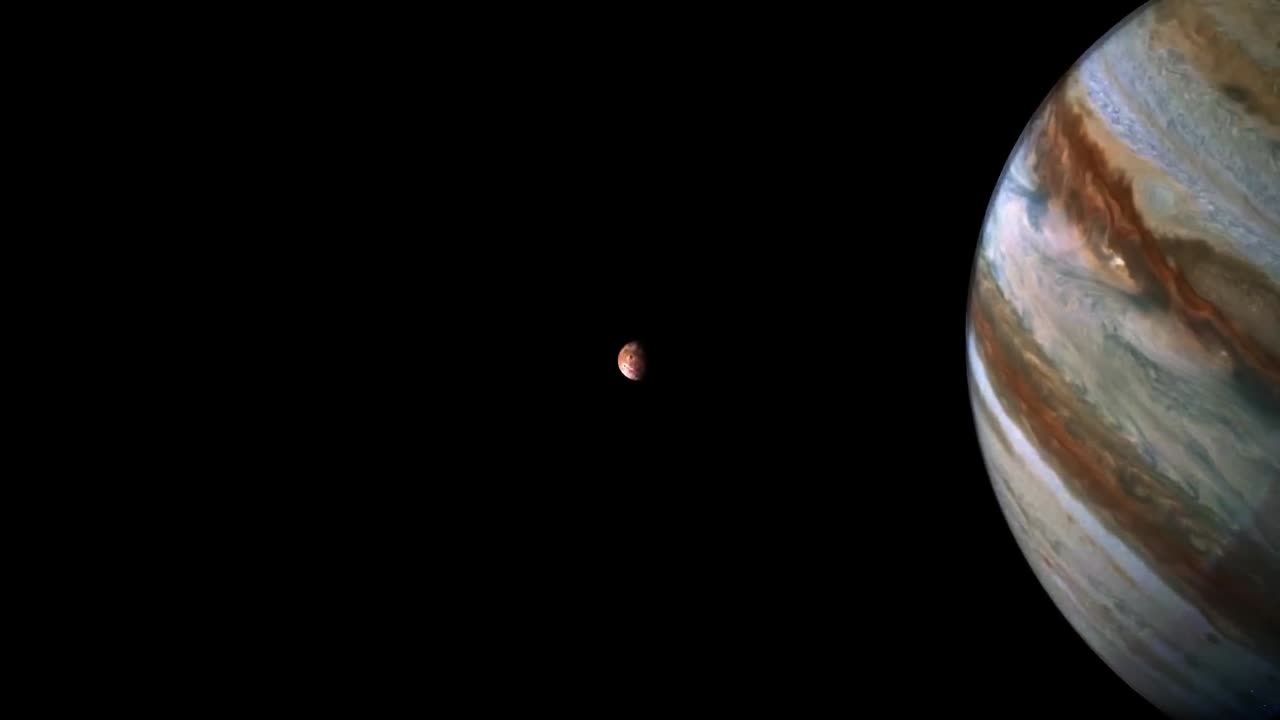Premium Only Content

NASA's Juno Spacecraft's Pass by Io and Jupiter
On May 16, 2023, NASA’s Juno spacecraft flew past Jupiter’s volcanic moon Io, and then the gas giant soon after. Io is the most volcanically active body in the solar system. Slightly larger than Earth’s moon, Io is a world in constant torment. Not only is the biggest planet in the solar system forever pulling at it gravitationally, but so are its Galilean siblings – Europa and the biggest moon in the solar system, Ganymede. The result is that Io is continuously stretched and squeezed, actions linked to the creation of the lava seen erupting from its many volcanoes.
This rendering provides a “starship captain” point of view of the flyby, using images from JunoCam. For both targets, Io and Jupiter, raw JunoCam images were reprojected into views similar to the perspective of a consumer camera. The Io flyby and the Jupiter approach movie were rendered separately and composed into a synchronous split-screen video.
Launched on Aug. 5, 2011, Juno embarked on a 5-year journey to Jupiter. Its mission: to probe beneath the planet's dense clouds and answer questions about the origin and evolution of Jupiter, our solar system, and giant planets in general across the cosmos. Juno arrived at the gas giant on July 4, 2016, after a 1.7-billion-mile journey, and settled into a 53-day polar orbit stretching from just above Jupiter’s cloud tops to the outer reaches of the Jovian magnetosphere. Now in its extended mission, NASA’s most distant planetary orbiter continues doing flybys of Jupiter and its moons.
Experience the mesmerizing celestial ballet as #NASA's Juno Spacecraft gracefully glides past the enigmatic moon #Io and the gas giant #Jupiter. Accompanied by the ethereal music of #Vangelis, this encounter with the cosmos promises to be a symphony for the senses, a dance of science and artistry. 🚀🌌 #SpaceExploration #CosmicEncounter #ArtandScience #SpaceSymphony #OuterSpace #SolarSystemExploration
-
 LIVE
LIVE
LumpyPotatoX2
5 hours agoKilling Floor 3 + SoulFrame: Co-op Showcase - #RumbleGaming
5,300 watching -
 2:10:50
2:10:50
vivafrei
6 hours agoEp. 274: Canada's War on Christianity! Is Candace Owens Cooked? SCOTUS, RFK Jr. AND MORE!
49.6K80 -
 38:09
38:09
The Mel K Show
3 hours agoMel K & Tim James | Are Hidden Dangers Lurking in Your Mouth? | 7-27-25
14.1K2 -
 LIVE
LIVE
PudgeTV
1 day ago🟠 Gaming on Rumble | Soulframe Early Access Gaming Showcase
135 watching -
 LIVE
LIVE
ttvglamourx
4 hours ago $0.55 earnedSearching To Destroy !DISCORD
159 watching -
 LIVE
LIVE
itsReel
2 hours agoGaming SUNDAY
88 watching -
 28:43
28:43
Liberty Hangout
3 days agoAnti-Trumpers Don't Know What They're Protesting
39.6K227 -
 20:33
20:33
Sideserf Cake Studio
1 day ago $3.73 earnedI Built A Bikini Bottom Fish Tank CAKE!
33.8K11 -
 LIVE
LIVE
Gore TV
2 hours agoNO LOOT?! Fine 😤 I’ll Build My Own Gun! 🔫🪵✨
132 watching -
 LIVE
LIVE
XxXAztecwarrior
2 hours agoPlaying Normals Big Red Hunting Delta Force
162 watching